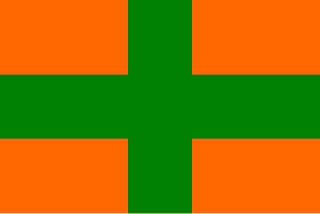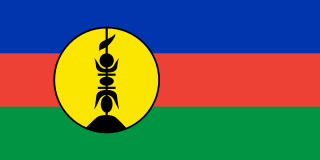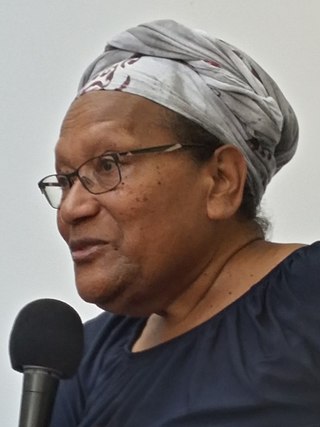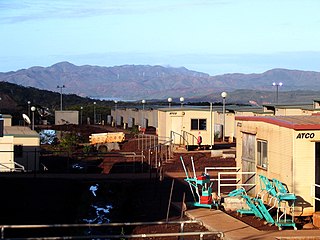
New Caledonia is a group of islands in the southwest Pacific Ocean, 220 km (140 mi) southwest of Vanuatu and 1,210 km (750 mi) east of Australia. Located 16,100 km (10,000 mi) from Metropolitan France, it forms a sui generis collectivity of the French Republic, a legal status unique in overseas France and enshrined in a dedicated chapter of the French Constitution.

New Caledonia is a French sui generis collectivity with a system of government based on parliamentarism and representative democracy. The President of the Government is the head of government, and there is a multi-party system, with Executive power being exercised by the government. Legislative power is vested in both the executive and the Congress of New Caledonia. The judiciary is independent of the executive and the legislature.
Future Together was a center-right political party in New Caledonia supporting the maintenance of political and administrative ties with France.

The Caledonian Union is a pro-independence and the oldest political party in New Caledonia. In the latest legislative elections of May 10, 2009, the party won around 11.65% of the popular vote, and 9 out of 54 seats in the Territorial Congress.
The Nouméa Accord of 1998 is a promise by the French Republic to grant increased political power to New Caledonia and its indigenous population, the Kanaks, over a twenty-year transition period. It was signed 5 May 1998 by Lionel Jospin, and approved in a referendum in New Caledonia on 8 November, with 72% voting in favour. Under the accord, three more referendum votes, on whether to remain a special collectivity of France or become an independent state, have been held.

Two flags are in use in New Caledonia, an overseas territory of France. Up to 2010, the only flag used to represent New Caledonia was the flag of France, a tricolour featuring three vertical bands coloured blue, white, and red known to English speakers as the French Tricolour or simply the Tricolour. However, in July 2010, the Congress of New Caledonia voted in favour of a wish to fly the Kanak flag of the independence movement FLNKS alongside the French Tricolour. The wish, legally non-binding, proved controversial. A majority of New Caledonian communes, but not all, now fly both flags, the rest flying only the French Tricolour.

The National Union for Independence is a militant socialist pro-independence alliance of political parties in New Caledonia. It is a component of the Kanak Socialist National Liberation Front (FLNKS) along with the Caledonian Union.
The Matignon Agreements were agreements signed in the Hôtel Matignon by Jean-Marie Tjibaou and Jacques Lafleur on 26 June 1988 between loyalists who wanted to keep New Caledonia as a part of the French Republic, and separatists, who wanted independence. The agreements were arranged under the aegis of the Government of France as a result of discussions and compromises arranged by Christian Blanc, the negotiator for Michel Rocard's government.

The Kanaks are the indigenous Melanesian inhabitants of New Caledonia, an overseas collectivity of France in the southwest Pacific. Kanak peoples traditionally speak diverse Austronesian languages that belong to the New Caledonian branch of Oceanic. According to the 2019 census, the Kanaks make up 41.2% of New Caledonia's total population – corresponding to around 112,000 people. The other populations are the Caldoche, who are European born in New Caledonia; the Zoreille, who were born in metropolitan France and live in New Caledonia, in addition to about 10% that are non-Kanak Polynesians and 10% that are mixed race.

Déwé Gorodey was a New Caledonian teacher, writer, feminist and politician. She was active in agitating for independence from France in the 1970s. She published poetry, short stories and novels. From 1999, she was a member of the New Caledonian government, representing the pro-independence Kanak and Socialist National Liberation Front. From April 2001 to June 2009, she served almost continuously as Vice President of the Government of New Caledonia.
Legislative elections were held in New Caledonia on 8 February 1953.

An independence referendum was held in New Caledonia on 4 October 2020. The poll was the second to be held under the terms of the Nouméa Accord, following a similar referendum in 2018.

Sonia Backès is a French politician in New Caledonia. She is the current leader of the Caledonian Republicans party and the President of the Provincial Assembly of South Province since 17 May 2019.
The COVID-19 pandemic was confirmed to have reached the French overseas collectivity of New Caledonia on 18 March 2020. All cases are on the main island of Grand Terre and are related to travel abroad. On 7 May, all cases had recovered.

The 2020 protests in New Caledonia began on 28 October 2020 over a plan to sell a Vale-owned nickel and cobalt mine to a consortium led by Trafigura. The nickel mine and plant is known as the Goro mine. Independence leaders and pro-independence protesters wanted for the nickel plant to be owned by citizens of New Caledonia rather than foreign investors, though various arrangements have been proposed.
An independence referendum was held in New Caledonia, a French territory in the South Pacific, on 12 December 2021. The vote was the third and final one to be held under the terms of the Nouméa Accord, following votes in 2018 and 2020.
Didier Poidyaliwane was a New Caledonian politician. A pro-independence activist, he was a member of the Caledonian Union (UC) and the Kanak and Socialist National Liberation Front (FLNKS) and strongly defended the rights of indigenous Kanak people. He served in the cabinet of Philippe Germain and Thierry Santa as a minister in the Government of New Caledonia.
Caroline Machoro-Reignier is a Kanak politician in New Caledonia. A member of the pro-independence Caledonian Union, she led the Kanak and Socialist National Liberation Front alliance in the Congress of New Caledonia from 2011 to 2014. In 1988, she was one of the signatories of the Matignon Agreements between New Caledonian loyalists and separatists.
In May 2024, protests and riots broke out in New Caledonia, a sui generis collectivity of overseas France in the Pacific Ocean. The violent protests have led to at least 13 deaths, the declaration of a state of emergency on 16 May, deployment of the French army, and the block of the social network TikTok.
The Federation of The National Rally formerly known as the National Front is a political party that acts as the regional wing of the French National Rally in the French Overseas Territory of New Caledonia. It is currently led by businessman and former Caledonia Together politician Alain Descombels.











